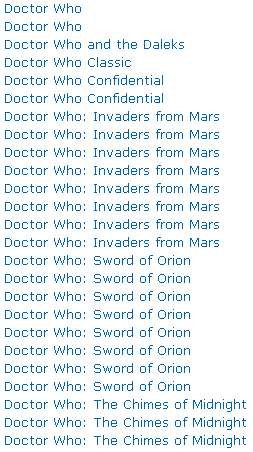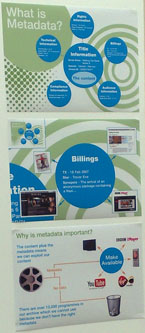BBC Programme pages illustrate the value of metadata and simplicity
A couple of weeks back in one of the softest of soft launches, the BBC introduced to their website programme support pages for every single programme.

Tom Scott was involved in the project, and has blogged about what it does, and what it hopefully will do in the future. It has long been overdue, as one of the main user expectations about visiting the BBC site is that it will have at least some information about every programme - and for the last ten year that simply hasn't been the case, as the new beta points out:
"The BBC website provides information and rich experiences to support the programmes we broadcast but, with around 1000 programmes broadcast every day across our radio and TV networks, coverage to date has not always been either comprehensive or permanent. If, for example, you want to find information on a programme you watched or listened to a couple of weeks ago, it is not always available and, even if it is available, it is not always easy to find."
From a pure information architecture point of few, it goes even further to point out that the BBC needs to get an agreed controlled vocabulary about programmes across the site. For a long time the BBC has used 'genre' to talk about broad types of programming like 'comedy', but the pages at bbc.co.uk/programmes also allow the user to slice the BBC's content by 'format'.

In this instance, format is not "30 mins, colour, with subtitles" or "windows media player file", but "Game & Quiz Shows" and "Makeovers". I think it is the only area of the site so far where 'format' has been exposed as a concept to the audience in this way. It looks to be a jolly useful way of describing programme content - after all is "They Think It's All Over" a sports programme, a comedy or a quiz? Hopefully now, rather than being classified according to the department that happened to commission it, it can be all three, and the audience can use all three to navigate to it.
This still leaves the BBC with the problem of how to label the actual media format of programmes in the future, but hey, that's for another day.
The project was done very quickly in a lightweight agile way, which is something I wholeheartedly approve of. I can't help finding it a little ironic though, that it came out of what was (one or two BBC re-organisations ago) the old radio website team.
The central new media team I worked with had a project to do just this several years ago - to produce a simple basic page for every single programme broadcast on the BBC, using the programme metadata and billing from the EPG, and with a persistent URL.
Somehow it got side-tracked into instead building an unwieldy content management system, mostly because of the requirements of the radio stations who agreed to be the first people to use it. It got rolled out and powered the Radio 3 site, and at the time Tom Coates blogged about the amount of effort that had gone into things like getting the URL structure right.
However, in those days, before the BBC got a bit more confident with 'light branding' and slapping a beta gif onto things, it had to be as part of a redesign of the entire BBC Radio 3 brand experience online. Radio 4 used the system for a while as well for some areas of content - you can spot the pages because they have /pip/ and some kind of hash-key in the URL.
Ultimately though, trying to work with the low quality of data associated with programmes within the BBC, and argue the toss with a radio content production team over the precise colour and location of links, became a pretty soul destroying process.
So thankfully, the new programme pages just take the data and run with it - branding, channel idents, and integrating them into the look and feel of a programme's parent site are all open questions for the future.
The quality of the data is much improved now as well, partly on account of having to get TV content into the iPlayer ingestion process, but it is still far from perfect. It doesn't take much clicking around within the new programme pages to spot orphaned episodes, or slight variations on show titles when to a human eye they are all the same series.

However, I think it is quite useful for the BBC to make these kind of errors visible on the web. As Phil Gyford, who also had a hand in it all, says:
This will all improve — hell, it can’t stay like that.I was pleased to see at the recent multiplatform expo I attended within the BBC that was a stand specifically about 'metadata'.

It is much easier to persuade programme makers and commisioners to change their behaviour if you can say to them "You didn't do x, y, or z in your production process, and now your web page has got junk information on it, live, and broken in front of the public right now", rather than saying "if you don't do x, y, and z, then at some unspecified time in the future there may be some unspecified problem with the information".